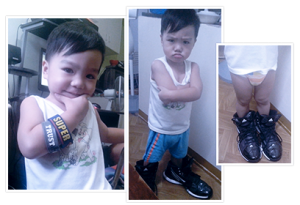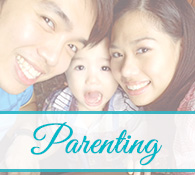Our baby is 2 years old and turning 3 this year. He is now in the stage that he is learning and exploring things around him. Children are like sponge, they easy absorbs things but don’t really understand. I notice he does things the same way we do. Like he dances every time he hears music that are up beat like his dad, or he wears his dad’s baller because his dad has one too or wear his dad’s big shoes and walk around with it.

It is funny when he does this… It’s so cute.
But what I also notice is that he don’t just imitates funny or good things that we do but also many things that shouldn’t be done by a child. As parents, we of course disciplines our child/children by one way or another. When he does things that are not good we tell him “No, don’t do that. That’s bad!” or give him the rod if he don’t listen or if he becomes unmanageable (we give it on the hands only). Then at one instance, we heard him said “No, don’t do that!” to the people at our house playing with him. The people laughed especially my mom. Yes, it’s funny or cute hearing a little boy saying that.
But what does it really mean? It made me realize and think…It just shows that a child follows what he sees…he imitates. “What monkey sees, monkey do”.
Teaching them by saying things that are right from wrong or giving them discipline is good and that’s another thing. But what really helps them to learn, is if they see us (their parents) doing it as well. Like in a mirror, we see our own image. But for our children, we are the image they see because they still don’t have the sense of themselves but absorbs what surrounds them. As parents, we should be living as an example to them. How can you expect them to follow if you yourself don’t. For example, a dad tells his son to stop smoking but he himself smokes. How can he defend that smoking is bad, if he himself do it as well. Get the point?
It is important for us to be aware of how we are. It is a great percent of how they will become as a person when they grow up. The things they see that we do whether good or not, registers on their minds that it is okay to do because we are doing it. As their parents, it is our responsibility to guide them to what is right and not to what is wrong.
Because of this, we are more aware of our actions. If he does things that are not good, we check first if our actions have led him to be like that or the people that surrounds him. And if it does, we adjust or change the things we do. It helps us to teach and guide him better. This is both a learning process for us (the parents) and the child.
